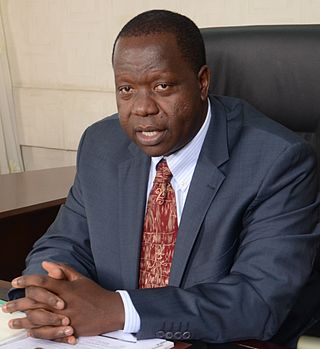Education in Kenya refers to the education system in Kenya. It is considered a basic right that should be offered to every individual. Education in Kenya predates to as early as the 18th century among the Swahili people. The earliest school was established by missionaries in Rabai. During the colonial era, the number of Kenyans with exposure to education steadily increased and a good number of them were privileged to proceed abroad for further education.

Friends School Kamusinga (FSK), popularly known as Kamu/Frischka, is a Kenyan Quaker national school established in 1956 and located in Kimilili, Bungoma County, Kenya. The school is located 400 kilometres from Kenya's capital city, Nairobi. It is annually ranked among the top schools nationwide in KCSE and has many notable alumni across business, creative arts, sports, engineering and politics.
The Kenya National Examinations Council (KNEC) is the national body responsible for overseeing national examinations in Kenya. Its current chairman is Professor Julius Omondi Nyabundi who succeeded Professor John Onsati. This council was established under the Kenya National Examinations Council Act Cap 225A of the Laws of Kenya, in 1980. In 2012 this act was repealed and replaced with KNEC Act No.29 of 2012.
Kianda School is a private, all-girls day school with a Catholic ethos located in the Westlands area of Nairobi, Kenya. The school was opened in 1977 by The Kianda Foundation, a non-profit organisation that aims to better Kenyan women's lives through education and Christian values. The school began with 40 students but has now grown to a student body of about 830 in both its primary and secondary school sections.
The Kenya Certificate of Secondary Education (KCSE) is an academic certificate awarded to candidates upon completion of secondary education in Kenya.

Kisii School is a public high school in Kisii, Kenya for boys, established in 1934.
Mang'u High School is a Kenyan Roman Catholic National High School established in 1925, located in Kiambu County along the Nairobi-Thika Highway six kilometres (3.7 mi) from Thika, Kenya. Mang'u High School is ranked among the top schools nationwide in Kenya Certificate of Secondary Education and has many eminent alumni including one Kenyan president, several vice presidents, Central Bank of Kenya governor and a former Cardinal.
Academic grading in Kenya is the grading system of Kenya.
The Machakos Institute of Technology' (MIT) is a private institute in Machakos, Eastern Province, Kenya. MIT has nine schools with an emphasis on social work, community development, and scientific and technological research.
Nakuru Boys High School is an all-boys high school in Nakuru, Kenya. It is among the 17 traditional national schools of Kenya, that have been in existence for more than 30 years.
The Kenya High School is a public girls' high school located on Mandera Road in the upmarket Kileleshwa suburb of Westlands Sub-County in Kenya's capital city, Nairobi.
justice Samwel Mukira Mohochi is a Kenyan [Judge] of the [High Court] human rights activist and attorney, with extensive legal experience on human rights litigation in national courts. He is an international human rights advocate before treaty monitoring bodies and the United Nations Human Rights Council.
Compit Educational Centre, or Compit for short, is a privately-operated Islamic primary and secondary day school located in Easleigh, Nairobi, Kenya.
Moi High school - Kabarak is located 20 km from Nakuru City, in Kenya's Rift Valley Province along the Nakuru – Eldama Ravine road. It shares the same compound with Kabarak University and Kabarak Primary.

The 8-4-4 System educational program is a system of education in Kenya with eight years of primary education, four years of secondary education and four years of university education. The system was introduced in 1985 to replace the 7-4-2-3 curriculum, which consisted of seven years of primary school, four years of lower secondary school, two years of upper secondary school and three years of higher education. The 7-4-2-3 system had been adopted when Kenya was part of the initial East African Community. Following the introduction of 8-4-4, CPE became KCPE while KACE became the Kenya Certificate of Secondary Education (KCSE). Primary school was made free and mandatory, and secondary and higher education were subsidized by the government.

Fred Okengo Matiang'i is a former Kenyan Cabinet Secretary. He served as the Cabinet Secretary for the Ministry of Interior and Coordination of National Government in Kenya. He assumed office on 8 July 2017 on acting capacity after the sudden Demise of Joseph ole Nkaissery, making him hold two cabinet positions concurrently, that is in the ministry of Interior and Coordination of National Government and Education, Science and Technology. He took up the full position of cabinet secretary for Internal Security and Coordination of National Government after being appointed by President Uhuru Kenyatta in January 2018 in the president's second comprehensive cabinet appointments. On 22 January 2019, President Uhuru Kenyatta, through Executive Order Number 1 of 2019, appointed him chairperson of the National Development Implementation and Communication Cabinet Committee. The committee is composed of all Cabinet Secretaries, The Attorney-General and the Head of the Public Service who acts as the secretariat.

The Green Garden Schools are a group of Kenyan private schools located in Kikuyu, Kiambu County, and Rongai just outside Nairobi, Kenya. The schools were founded by Prof. Peter Keiyoro and Esther Njenga in 1991. The schools are independent 8-4-4 curriculum co-educational day and boarding schools offering nursery, primary and secondary schooling.

Kapsabet High School popularly known as KB is a public national high school for boys located in Kapsabet in Nandi County, about 40 kilometers from Eldoret.
George Albert Omore Magoha was a Kenyan consultant surgeon, academic administrator and technocrat, who served as a Professor of Surgery at Maseno University's School of Medicine, in Kisumu County as from 17 January 2023 till his death.
Purity Ngina is a Kenyan Academician and the Research and Assessment Manager at Zizi Afrique Foundation. Prior to joining Zizi Afrique Foundation Purity was a lecturer at Strathmore University in Nairobi. At age 28, she became Kenyan youngest Doctor of Philosophy (Ph.D.) graduate in Biomathematics from the same University





